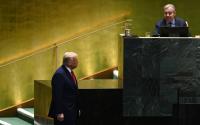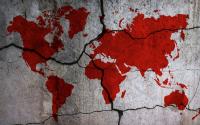I'm not sure how far people in Britain have appreciated just what an amazing performance that speech was. The assembled members of both houses of Congress are generous with their standing ovations on these occasions, but here they were jumping like a gym class. (17 times according to Fox News, 19 according to the Guardian.) At one point I saw Colin Powell give a little, incredulous shake of his head, as they rose to their feet yet again. It must have been good for their cholesterol levels.
Blair played all the old Anglo-American chords. There was the language of the King James Bible, familiar to the Pilgrim Fathers and recycled through the semantic mill of first and second world war transatlantic patriotism: our soldiers in Iraq "did not strive or die in vain". There was a touch of the Shakespearean: "11 September was not an isolated event/but a tragic prologue, Iraq another act/and many further struggles will be set/upon this stage before it's over". (As so often with Blair, the syntax is a mite sloppy - what in this sentence is "it"? - but never mind. New Labour, New Shakespeare.) There was even an elfin smidge of Tolkien: "In another part of the globe there is shadow and darkness." In the land of Mordor, where the shadows lie.
And, of course, there were the obligatory little jokes about being a British prime minister in Washington. Having been shown the place where the British had burned the congressional library in 1814, he quipped: "I know this is kind of late, but sorry." That colloquial "kind of" is already halfway to the American conversational use of "like". Next time a British prime minister speaks to a joint session of Congress, following Churchill, Attlee, Thatcher and now Blair, he or she - brought up on a diet of the TV sitcom Friends - will probably say: "I know this is, like, late, but we're, like, sahrreee."
More seriously, the speech was soaked from start to finish in that "language of liberty" which has made a common Anglo-American political discourse for four centuries. On my count, the words "freedom", "free" and "liberty" appeared 27 times. Would a homily by any other European leader come anywhere near that freedom count? It ended with this astonishing hymn to America: "Tell the world why you're proud of America. Tell them that when the star-spangled banner starts, Americans get to their feet - Hispanics, Irish, Italians, central Europeans, east Europeans, Jews, Muslims, white, Asian, black, those who go back to the early settlers and those whose English is the same as some New York cab drivers' I've dealt with, but whose sons and daughters could run for this Congress. Tell them why Americans, one and all, stand upright and respectful. Not because some state official told them to, but because whatever race, colour or creed they are, being American means being free." Small wonder many Americans think that Blair is the best president they'll never have.
Yet in between the purple flourishes, Blair delivered a fine, substantive speech about the state of the world today, making several sharp points of which all Europeans would be proud: that poverty is a major cause of terrorism; that America should want to work with Europe as a whole; that this partnership with Europe must be based on "persuasion, not command". "Yes," Blair said, adopting Donald Rumsfeld's formula, "it is not the coalition that determines the mission, but the mission the coalition. But let us start by preferring a coalition and acting alone if we have to, not the other way round. True, winning wars is not easier that way, but winning the peace is." Again, he got them to applaud, while the camera cut to Rumsfeld, looking wry. So it went on: the need for a viable Palestinian state, supporting reform in Iran, war on want in Africa, environmental protection "beyond Kyoto".
A truly gobsmacking performance - and behind it there is a consistent strategic approach, on which he has now gambled his political future. Blair, alone among European leaders, has fully realised what 9/11 means to America: that Washington is at war, that this is America's blitz - a fact of which you're reminded every time you have to take off your shoes at the ferocious airport security controls, in case you're a shoe-bomber.
Blair has calculated that you can only influence the hyperpower's response by engaging fully with it. Influence? What influence? you may ask. The influence of a lapdog? But I think that's wrong. I doubt that Bush went to the UN for the first time over Iraq because of Blair; he certainly did the second time. Blair has constantly pressed him to take seriously the Middle Eastern peace process between Israel and Palestine; now Bush is doing so, to no obvious electoral advantage. Cause and effect would be too large a claim, but a little influence may justly be inferred.
This is not much, but does anyone have a better way to influence a wounded giant? Can you name me a single point on which Jacques Chirac or Gerhard Schröder have modified American policy for the better? If all Europe adopted Blair's approach then the "but" in his emotionally sincere but also calculated "yes, but" would be more effective.
However, the logic of this post-9/11 strategic choice led him to join in a war that now looks increasingly difficult to justify on the grounds that Blair himself offered - emphasising, far more than the Bush administration did, the centrality of weapons of mass destruction as compared with regime change, Saddamite genocide or alleged links to al-Qaida. It's a Shakespearean irony that Dr David Kelly, the British defence scientist caught in the crossfire between Alastair Campbell and the BBC, apparently committed suicide on the very day that Blair delivered his missionary speech to Congress. I'm sure that Blair always acted in good faith; I'm sure he convinced himself that the intelligence evidence credibly suggested a real and present danger of usable, deliverable weapons of mass destruction in Iraq. But unless they find some more evidence soon, I cannot believe that it was true.
As I write, here in Washington, the White House is busily disowning the claim about Saddam's uranium supplies from Africa that President Bush ascribed to British intelligence ("the British government has learned") in his state of the union address from that same congressional pulpit, a claim that Blair himself repeated standing next to the President at their joint press conference only last Thursday.
Were Blair to fall over the justification of the Iraq war, his Washington induced toppling would be just the latest in a rich line of Anglo-American ironies. We would then lose the best president America will never have - but Europe still might.
[email protected]http://www.guardian.co.uk/comment/story/0,3604,1004735,00.html






